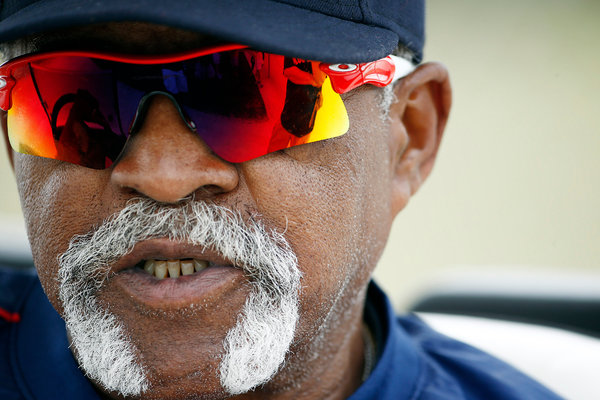
Yoan Moncada heads to Boston from Cuba, encouraged by a man who knows both
It was an unusually cold day in early February at the Red Sox complex here. A group of men, most of them Boston’s top talent evaluators, wore jackets and huddled in the dugout against the sting of the wind, watching Yoan Moncada, a 19-year-old Cuban second baseman, go through his audition.
Also watching that day was Luis Tiant, the Cuban pitcher who became a sensation in Boston when he pitched there from 1971 to 1978. Tiant, who left Cuba in 1961, is now an instructor with the Red Sox. But on that day he was more of a recruiter, on hand to personify the direct line from Cuba to Boston.
The Red Sox eventually committed $63 million to sign Moncada, half of which goes to the player and half to Major League Baseball as a tax payment. Moncada’s $31.5 million signing bonus is a record for a player under 23.
Moncada’s conversation with Tiant about being Cuban and playing in Boston played a part in swaying him toward the Red Sox, said David Hastings, the certified public accountant turned agent for Moncada.
“He sat down and explained to us what playing in Boston was like with a Cuban background, for a Cuban player,” Moncada said through an interpreter. “I really appreciate his support in all this.”
Hastings said he could not claim that Tiant’s chat with Moncada was the deciding factor in the player’s decision. The Red Sox offered him substantially more money than other teams — including the Yankees, who were willing to pay him a $25 million bonus and who had a recent history with Cuban-born players, most notably Orlando Hernandez and Jose Contreras.
Tiant helped describe to Moncada the path that Tiant helped clear. Ben Cherington, the Red Sox’ general manager, said Moncada would probably go to Class A Greenville, in South Carolina, to start his development in the United States, and Moncada said his goal was to be in the major leagues by next year, when he is 20. Some believe he has the talent to do it.

Tiant, now 74, pitched in the Mexican League at 19 and made his major league debut with the Cleveland Indians at 23. He played his most important years for the Red Sox in perhaps the most tumultuous period in Boston’s recent history, when racial tensions exploded over school busing. The legacy of that era made some athletes wary of playing in Boston for years.
Tiant painted a different picture of the city to Moncada, describing Boston as a hospitable place where a Cuban player could thrive and feel welcome.
“I told him Boston is a good place to play,” Tiant said. “I lived there for 43 years. I live in Maine now, but I lived in Boston for years, and for me, it is my second country. People were great to me, and they are still great to me. They show me respect, admiration and love. They don’t have that anywhere else I’ve been, just in Boston.”
Tiant was a larger-than-life figure in Boston: a portly, cigar-smoking character whose starts were big events. He was also known as an exceptional clutch performer. In the memorable 1975 World Series, Tiant won two games against the Cincinnati Reds, including a shutout in Game 1. He also won the final regularly scheduled game of the 1978 season with a two-hit shutout against the Blue Jays that forced the famous one-game playoff with the Yankees.
But Tiant’s status as Boston sports royalty was solidified as far back as 1972, when he went 15-6 with a 1.91 E.R.A., the best in baseball that season.
Tiant was unable to return to Cuba for 46 years. After leaving Cuba, he did not see his father for 14 years until Luis Tiant Sr. was allowed to come to Boston to watch the 1975 World Series.
“It’s sad,” Tiant said. “It was 46 years before I go back to my country, and a lot of my friends and people I played with and went to school with, they died. It’s not a comfortable situation. I didn’t see my father for 14 years. I thought I would never see him again.”
Moncada grew teary-eyed when he spoke of his own family. He said that until he left Cuba nine months ago, he had not gone more than a week without seeing his family. But the future might not be as difficult for him as the past was for Tiant. The governments of Cuba and the United States have initiated a process that could lead to a normalization of relations. If that is achieved, it may not be as difficult for the current group of Cuban players to travel home and then return to the United States to play.
“I don’t know much about the ongoing relations,” Moncada said. “I’ve heard some good things about it and the possibilities. But I’m just focused on being here now, and I just want to play ball.”
(From: The New York Times)

